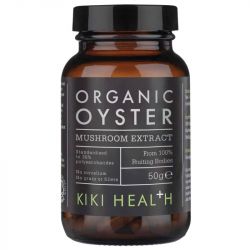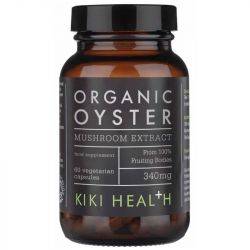Oyster Mushroom Supplements
Oyster mushrooms are often taken as a supplement because of the expense of buying raw Oyster mushrooms and also the difficulty of growing them at home. They are availale in powder and capsule form and boast a range of health benefits.
All you need to know about Oyster
What are Oyster Mushrooms?
Oyster mushrooms (scientifically known as Pleurotus ostreatus) are a type of edible fungus belonging to the Pleurotaceae family. They are widely cultivated and consumed around the world for their delicate flavour, tender texture, and nutritional benefits. Oyster mushrooms are named for their resemblance to oysters both in appearance and taste, with a mild, slightly sweet flavour and a chewy texture when cooked.
What do Oyster Mushrooms do?
Oyster mushrooms contain a range of bioactive compounds and subtances:
-
Beta-Glucans: Oyster mushrooms are rich in beta-glucans, which are complex polysaccharides with immune-modulating properties. Beta-glucans have been shown to stimulate the immune system, enhance macrophage activity, and improve overall immune function.
-
Ergothioneine: Oyster mushrooms are one of the few dietary sources of ergothioneine, a unique antioxidant compound that scavenges free radicals and protects cells from oxidative damage. Ergothioneine has been linked to various health benefits, including anti-inflammatory and neuroprotective effects.
-
Polysaccharides: Oyster mushrooms contain various polysaccharides, including glucans and heteropolysaccharides, which contribute to their immune-stimulating properties and may have antioxidant and antitumor effects.
-
Lectins: Oyster mushrooms contain lectins, which are carbohydrate-binding proteins that have been studied for their potential immunomodulatory and antitumor activities.
-
Triterpenoids: Oyster mushrooms contain small amounts of triterpenoids, which are bioactive compounds with antioxidant, anti-inflammatory, and anticancer properties. Triterpenoids may help regulate immune function and protect against chronic diseases.
-
Phenolic Compounds: Oyster mushrooms contain phenolic compounds, including flavonoids and phenolic acids, which have antioxidant and anti-inflammatory properties. These compounds help neutralize free radicals and reduce inflammation in the body.
-
Vitamins and Minerals: Oyster mushrooms are a good source of vitamins (such as B vitamins, including niacin, riboflavin, and pantothenic acid) and minerals (such as potassium, phosphorus, and copper), which are essential for overall health and well-being.
What are the benefits of taking Oyster Mushrooms?
Here are some of the key benefits associated with Oyster mushrooms:
-
Immune Support: Oyster mushrooms contain beta-glucans and other bioactive compounds that have been shown to modulate the immune system. They may help enhance the body's defense mechanisms, making it more effective at fighting off infections and diseases.
-
Antioxidant Protection: Oyster mushrooms are rich in antioxidants, including ergothioneine, phenolic compounds, and vitamins like vitamin C and vitamin E. These antioxidants help neutralize harmful free radicals in the body, reducing oxidative stress and lowering the risk of chronic diseases associated with inflammation and oxidative damage.
-
Heart Health: Oyster mushrooms may help promote heart health by lowering cholesterol levels, reducing blood pressure, and improving overall cardiovascular function. The beta-glucans and other bioactive compounds in Oyster mushrooms have been shown to support healthy blood lipid profiles and improve endothelial function.
-
Blood Sugar Regulation: Some research suggests that Oyster mushrooms may help regulate blood sugar levels and improve insulin sensitivity, making them beneficial for individuals with diabetes or those at risk of developing the condition. The polysaccharides and dietary fiber in Oyster mushrooms may contribute to these effects.
-
Digestive Health: Oyster mushrooms are a good source of dietary fiber, which is important for digestive health and regularity. Fiber helps support a healthy gut microbiota, promotes bowel movements, and may reduce the risk of digestive disorders like constipation, diverticulosis, and colon cancer.
-
Nutritional Support: Oyster mushrooms are low in calories and fat but rich in essential nutrients, including protein, vitamins (such as B vitamins and vitamin D when exposed to sunlight), minerals (such as potassium, phosphorus, and iron), and antioxidants. Including Oyster mushrooms in your diet can help provide a wide range of nutrients necessary for overall health and well-being.
-
Weight Management: Oyster mushrooms are low in calories and carbohydrates but high in fiber and protein, making them a nutritious addition to weight loss and weight management diets. The fiber and protein in Oyster mushrooms help promote feelings of fullness and satiety, reducing overall calorie intake and supporting healthy weight management.
-
Type of Benefits:
- Immune Support: Some people may experience a boost in immune function relatively quickly after incorporating Oyster mushrooms into their diet or supplementation routine. This could manifest as fewer instances of illness or faster recovery times from infections.
- Blood Sugar Regulation: For individuals using Oyster mushrooms to help regulate blood sugar levels, it may take several weeks to months to observe significant effects on glucose metabolism and insulin sensitivity.
- Antioxidant Effects: The antioxidant properties of Oyster mushrooms may provide gradual benefits over time, such as reducing oxidative stress and supporting overall health. These effects may become more noticeable with consistent consumption.
-
Consistency and Dosage:
- Consistently consuming Oyster mushrooms over an extended period may lead to more pronounced and sustained effects compared to sporadic use. Additionally, the dosage used may influence the speed and intensity of the benefits experienced.
-
Individual Variability:
- Individual responses to Oyster mushrooms can vary based on factors such as metabolism, genetics, overall health, and the presence of underlying health conditions. Some people may notice improvements sooner than others, while for some, it may take longer to observe any noticeable effects.
-
Form of Consumption:
- Oyster mushrooms can be consumed in various forms, including fresh, dried, or as supplements. The form in which they are consumed may influence how quickly their beneficial compounds are absorbed and utilized by the body.
When is the best time to take Oyster Mushrooms?
Here are some considerations to help determine the optimal timing:
-
For General Health Maintenance:
- Oyster mushrooms can be consumed at any time of the day as part of a balanced diet to support overall health and well-being. Many people choose to incorporate them into meals or snacks throughout the day.
-
For Immune Support:
- Oyster mushrooms are often taken to support immune function. In this case, consuming them in the morning or earlier in the day may be beneficial as it allows the body to take advantage of their immune-boosting properties throughout the day.
-
For Blood Sugar Regulation:
- If you're using Oyster mushrooms to help regulate blood sugar levels, consider consuming them with meals or snacks that contain carbohydrates. This can help mitigate spikes in blood sugar and enhance the mushrooms' potential benefits for glucose metabolism.
-
For Weight Management:
- If you're incorporating Oyster mushrooms into your diet to support weight loss or weight management efforts, consuming them before meals may help promote feelings of fullness and satiety, potentially reducing overall calorie intake.
-
For Convenience:
- Choose a time of day that aligns with your schedule and preferences. Some people find it easier to incorporate Oyster mushrooms into their morning routine, while others may prefer to consume them with lunch or dinner.
-
Consistency is Key:
- Regardless of the specific timing, consistency is essential for maximizing the potential benefits of Oyster mushrooms. Aim to include them regularly in your diet or supplementation routine to support long-term health outcomes.
What are the side effects of taking Oyster Mushrooms?
Oyster mushrooms are generally considered safe for most people, and they are well tolerated when consumed as a food or supplement.
That said if you experience any kind of common allergic reaction (e.g. Itchy Skin, Rashes) then you should immediately stop using them.
Can I take Oyster Mushrooms everyday?
How do I grow Oyster Mushrooms at home?
Here's a basic overview of how to grow Oyster mushrooms using a substrate-based method:
Materials Needed:
- Oyster Mushroom Spawn: Purchase Oyster mushroom spawn from a reputable supplier. Spawn is typically sold in the form of grain spawn or sawdust spawn.
- Substrate: Common substrates for growing Oyster mushrooms include pasteurized straw, coffee grounds, cardboard, or a mixture of these materials.
- Growing Container: Use a plastic bag, bucket, or other container to hold the substrate.
- Humidifier or Misting System: Oyster mushrooms require high humidity levels for optimal growth.
- Temperature-Controlled Environment: Oyster mushrooms grow best at temperatures between 65-75°F (18-24°C).
- Sterile Environment: Maintain cleanliness and sterilize equipment to prevent contamination.
Steps to Grow Oyster Mushrooms:
-
Prepare the Substrate:
- If using straw, soak it in water for several hours or overnight to hydrate it. Drain excess water and pasteurize the straw by heating it to 160-180°F (71-82°C) for about 1-2 hours. Allow the straw to cool before proceeding.
- If using coffee grounds or cardboard, pasteurize them by microwaving or boiling them for a few minutes. Allow the substrate to cool before proceeding.
-
Inoculate the Substrate:
- Once the substrate has cooled, transfer it to a clean container or plastic bag.
- Mix in the Oyster mushroom spawn thoroughly to distribute it evenly throughout the substrate.
-
Incubate the Spawn:
- Seal the container or bag to create a humid environment and place it in a warm, dark location (around 70-75°F or 21-24°C) for 1-2 weeks to allow the mycelium to colonize the substrate fully. This is known as the spawn run phase.
-
Trigger Fruiting:
- After the mycelium has colonized the substrate, expose it to environmental cues that trigger fruiting. This usually involves reducing the temperature to around 55-65°F (13-18°C) and increasing humidity levels.
- Mist the substrate regularly to maintain high humidity levels, or use a humidifier to create a humid growing environment.
-
Harvest the Mushrooms:
- Oyster mushrooms will begin to develop as clusters of caps along the surface of the substrate. Harvest them when the caps are fully grown but still young and tender.
- Cut the mushrooms at the base of the cluster using a sharp knife or scissors.
Additional Tips:
- Outdoor Cultivation: Oyster mushrooms can also be grown outdoors on logs or wood chips. Drill holes in the logs, insert spawn, and seal with wax to prevent contamination. Keep the logs in a shaded, humid area and maintain moisture levels to encourage mushroom growth.
- Patience is Key: Growing Oyster mushrooms can take several weeks from inoculation to harvest, so be patient and monitor the process carefully.



